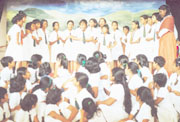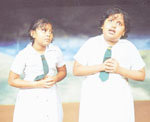
7th October 2001
News/Comment|
Editorial/Opinion| Plus|
Business| Sports|

Repeat after me...
Memory lapses are a cause of concern in this
age of information overload
Meghan Pierce is a 16-year-old sen- ior whose excellent memory has helped her achieve a 3.9 grade point average in a tough Fairfax country, Virginia, academic programme. But asked which of last year's lessons she is forgetting this summer, she joked, "Everything."
George Spilich, chairman of the Psychology Department at Washington College in Chestertown, U.S and researcher on memory, can recollect sudents from 20 years ago and knows where they sat but he's not sure what he ate for lunch last week.
It's not the summer sun causing the lapses. In Pierce's case, she's having the most trouble remembering Spanish and history facts. Experts say the problems is infrequency of use; in Spilich's he simply hasn't organised a structure in his head to store that information. Teachers construct in their brains a schema - or organisational structure that more easily remembers students than meals.
Memory lapses, once chiefly the worry of the elderly, have emerged as a source of anxiety among folks of all ages in this era of information overload. "My mom will tell me to do a chore and I'll walk upstairs to get the vacum cleaner, and I'll have to walk back downstairs to ask her what I was supposed to do," said Pierce, who participates in the International Baccalaureate programme at Robinson Secondary School.
The concern is fuelling many people's obsession with improving memory, seen in the millions of dollars spent each year on books and herbs of scientifically dubious value that promise sharper recall.
Researchers - who are just now learning about the complex brain processes that create and store short term, episodic and long term retention, say memory can indeed be improved.
Simpler
But the keys to achieving it are simpler than you might think: Lots of practice and better organisation. Not to mention focus, something that was reinforced to renowned cellist Yo-Yo Ma after he left his $2.5 million, 266-year old cello in a New York taxi in 1999 (it was recovered).
Misplace keys? Keep them in the same place every day. Forget names? Use word associations: knowing someone's name is Baker means less than remembering that someone is a baker.
And new research is showing that memories can be diminished by stress, nicotine and even small amounts of alcohol, as well as physical trauma. Young soccer players who take a lot of head shots report some mild memory problems, Spilich said. Besides, experts say, forgetting something is nomal.
"We function so well as human beings because in fact we forget things at a very efficient rate," said James Olds, director of George Mason University's Krasnow Institute for Advanced Study, which is dedicated to the study of human cognition. "If we flawlessly remember everything about every aspect of every day, we would have tremendous difficulty given the fact that our brains are limited... forgetting is as important biologically as memory."
Although folks who forget how to spell common words or even when to pick up their children worry that they are losing their memories, they probably aren't, experts said. "Society is facing problems of baby boomers getting older and the kinds of memory failures people have are usually mild, trivial and normal," said Mony De Leon, director of the New York University Centre for Brain Health.
It is troublesome, however, when people cannot hold on to new information for more than a few seconds, says one expert. And, said Terry Goldberg, a neuropsychologist in Bethesda, Maryland, it is time to get checked when people close to you say, "Boy, you are becoming really forgetful". Forgetting long division over the summer doesn't count, in part because lots of "lost information" isn't really lost. The foundation has probably been retained in the brain, and it can be easily retrieved with review in the fall, experts said.
What students generally lose over summer are isolated facts not embedded in a larger framework, said Ira Black, chairman of the Department of Neuroscience and Cell Biology at the Robert Wood Johnson Medical School, New Jersey.
It is also easier to forget information that is new and different, said Alan Brown, a Southern Methodist University psychology professor. "If you have been studying English grammar all year, it is less likely to be forgotten than the Spanish which you first started talking in the spring semester."
Easier
Of course, it would be easier to excel if everybody had the kind of recall ability that American presidential historian Michael Beschloss has.
Beschloss can recall speeches, word for word, that he hasn't seen in years, and he can do that with historical, literary and geographic material. It is as if, he said, his brain sees a copy of the text scrolling down or, if he has heard a speech, as if his ear is hearing a recording. Whether his ability constitutes "photographic" memory is unclear, because researchers are divided about whether such brains operate differently from most.
"I have good news and bad news," Spilich said. "The good news is that
all of us can increase our ability to remember things, but the bad news
is that there is no easy road... Remember the old joke of how you get to
your destination? Practice, practice, practice."
Memory master
Studying for a test? Here are some tips to help you- Try to study orally if you are an auditory person. Say the information out loud to yourself. If you are visual, make a diagram or outline. If you are kinesthetic, make the learning more active by copying and recopying your notes.
- Find a study location that has an optimal amount of background noise and activity. If it's too quiet, you will doze off. If it is too distracting, your attention will wander to what is around you. Just right and you will stay on task.
- Plan frequent short breaks. Don't try to study for too long a stretch (more than an hour). ù If you are studying for a test, try to make your study conditions resemble the test conditions. Studying is like a dress rehearsal for a play, except the play is the test. For example, practise writing answers down - just thinking or saying the answers won't be as effective because you won't be doing this on the test. Don't study in your pyjamas; you won't be wearing those during the test, will you?
Magic at M.C.
By Laila Nasry
It might well have been assembly time at the Methodist College hall, for every available seat was occupied by a small uniform-clad figure. But this was no solemn gathering, instead the air was filled with a contagious exuberance, interspersed with childish chatter. A gay tune from the piano enlivened the mood even more.Girls, girls and more girls were running on and off stage peeping through
their donkey fringes, flashing  milk
teeth smiles (some toothless!), singing, dancing and obviously having lots
of fun.
milk
teeth smiles (some toothless!), singing, dancing and obviously having lots
of fun.
The rehearsals for the 'The Magic Beanstalk' were in progress and all 740 students of the primary school of Methodist College between the ages of 5-10 were taking part. An operetta, 'The Magic Beanstalk' is identical to the well-loved fairy tale 'Jack and the Beanstalk', but for its different and rather hilarious ending.
One shout from the director 'choir on stage' starts the play proper and soon the hall is filled with harmonious voices narrating the story through song. A youthful Jack appears, a homely mother soon after and so the story unfolds.
The scene at the fair is lively and colourful with a bean selling magician
and the performances by gypsies, Japanese girls and quaint Dutch dancers
- 'the attractions brought from the four corners of the  world'.
Much dancing is promised with even the cows doing a jig.
world'.
Much dancing is promised with even the cows doing a jig.
The giant, makes a noisy entrance shouting 'fee-fie-foe-fum! I smell the blood of an Englishman' and stomping down the magic beanstalk in search of Jack - quite ignorant of his rather hilarious fate.
The entire production is a combined effort by the MCites with the past pupils lending a helping hand. The operetta is directed by Rochelle Jansen with backdrops handled by Tania Mamujee. The music is provided by Mrs. Lilani Jayatunga, Radhika Watson and friends and the printing of the souvenirs is handled by Jennifer George.
The operetta with all the elements of an evening of family entertainment will go on the boards at the Methodist College Auditorium on October 12 and 13 at 7 p.m.







Return to Mirror Magazine Contents
![]()
Front Page| News/Comment| Editorial/Opinion| Plus| Business| Sports| Mirror Magazine
Please send your comments and suggestions on this web site to

